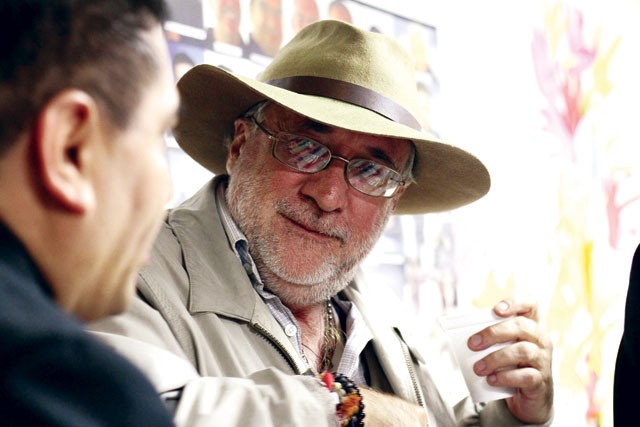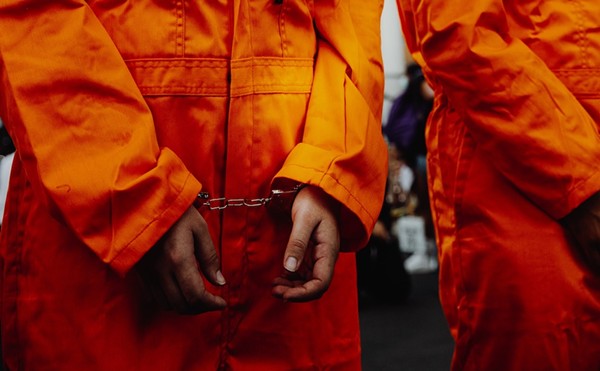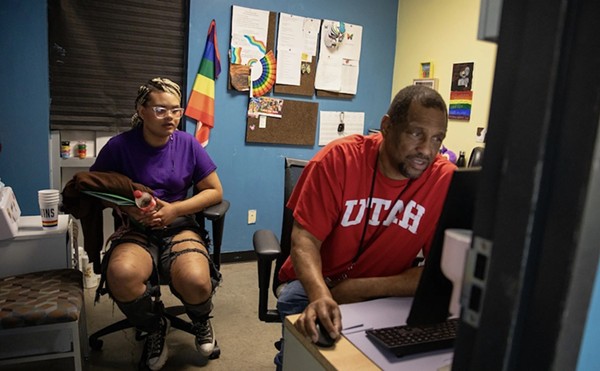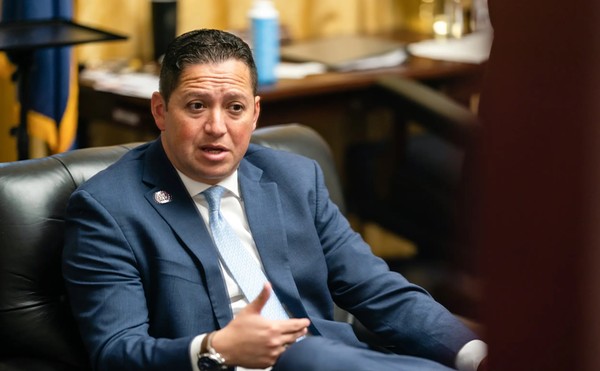Javier Sicilia's words still ring of poetry, though he says he's stopped writing it. A renowned novelist, essayist, and poet — winner of Mexico's top poetry prize three years ago — Sicilia told mourners gathered at his son's funeral in May 2011 when he read his final poem: "No puedo escribir más poesía … la poesía ya no existe en mí."
It's no longer in me.
The murder of his son Juan Francisco last year, an innocent 24-year-old university student found along with six of his friends bound and shot by drug traffickers in Cuernavaca, shook Sicilia's world. With deep anguish also came conviction. With the rallying cry "¡Hasta la madre!" Sicilia became the unlikely front man to a people's movement across Mexico, leading peace marches throughout last year to publicly denounce the violence, the cartels, and the government corruption that's allowed the problem to fester.
Now Sicilia, over 40 Mexican families broken by drug violence, and a slate of activists and human rights organizations have turned their sights north, traveling the length of the U.S.-Mexico border in a month-long Caravan for Peace. They aim to highlight the instability in Mexico along with U.S. drug policy, saying Americans shoulder equal blame in Mexico's current chaos.
Before the caravan's hours-long gathering with San Antonio families and religious leaders at St. Leonard Parish on the city's South Side, Sicilia delivered his own indictment of the War on Drugs begun under President Richard Nixon. Mexicans endure death, destruction, headless and mutilated bodies day after day as Mexico wars with the cartels. "This is all to prevent drug consumption in the U.S.," he said. "In all senses, this war is a failure, a horror, and the opening of doors into hell."
Since the start of Mexico's drug war, ramped up under Mexican President Felipe Calderón in 2006, some 70,000 people have disappeared or been murdered. The victims include the sister of Tere Vera, Minerva Vera Alvarado, who vanished in April 2006 in Oaxaca. "I have asked for justice, I have asked for the authorities to help me find my sister," Vera told the Current Friday. "I have traveled half the length of Mexico with her photo, looking, looking. The authorities won't investigate."
Vera smiled briefly, remembering her sister, a generous, giving woman, she said. Living next to a train line, she made it her mission to aid migrants moving north, Vera said. "She would give them water, clothes, anything she could."
Sorrow and pain follow the two buses that make up the Caravan for Peace. Olga Reyes of Chihuahua says six family members, all activists, have been killed, while many others in her family have fled, living in exile due to cartel threats. "This caravan is giving space for victims to speak out in a dignified way," said Janice Gallagher, an activist, doctoral candidate at Cornell University, and organizer with the caravan.
Groups taking part in Sicilia's Movement for Peace with Justice and Dignity (MPJD) — like the Drug Policy Alliance, the Center for International Policy's Americas Program, and Witness for Peace, among others — drafted the current MPJD platform at a mid-June weekend conference, Gallagher said. As the caravan takes the platform north, they hope to steer dialogue on drugs away from the simple prohibition-versus-legalization polarity into more humane territory, giving U.S. policymakers plenty to chew on by calling for suspension of U.S. assistance to Mexico's armed forces and a shift from military aid to development assistance. They call for tougher policies to stop the river of guns flowing from the U.S. into Mexico — particularly through Texas and Arizona — and increased federal crackdowns on money laundering. The platform also calls for better U.S. protections for immigrants displaced by violence seeking refuge in the U.S.
"We've come to the conclusion that the drug war is an abject failure, it needs to be ended," said Dean Becker, a Pacifica radio show host and activist with the group Law Enforcement Against Prohibition following the caravan. "The U.S. runs its drug war much in the same way these cartels do. It's plata or plomo, it's take the silver or lead," he said, referencing the common cartel expression to force cooperation with either a bribe or bullet. It's the same with the U.S. military aid, he insists, giving South and Central American governments the option to take millions to carry out the war on drugs, "or we flag them, put them on the bad-actors list, and cut off trade. … We need a fundamental shift in the way we approach this problem."
Key to Sicilia's message to the U.S. is not only how drug violence has ravaged Mexico, but how the drug war has fractured families on the U.S. side of the border. Kicked-off in San Diego and trailing along the border states before heading into Louisiana, Mississippi, Alabama, and Georgia, Sicilia's caravan brings the message that the drug war is demonstrably ineffective and inhumane. Flanked by representatives with groups like the NAACP — which sends members to speak with Sicilia in every city the caravan visits — Sicilia talks of how U.S. drug policy, and the increased militarization of drug enforcement, has turned the U.S. into an incarceration nation, disproportionately jailing African-Americans and Hispanics along the way. Two-thirds of all prisoners held on drug-related charges are people of color, according to the Washington-based The Sentencing Project.
The U.S. has some 760 prisoners per 100,000 citizens, as much as 10 times as many as other developed countries, and the U.S., home to 5 percent of the world's population, also plays home to 25 percent of the world's prisoners.
Chalk it up to the war on drugs, activists with the caravan say. Incarceration in the U.S. has skyrocketed since Nixon launched the drug war, quadrupling just since the 1980s, while drug convictions rose ten fold between the 1980s and 1990s. More than half of federal inmates are in on drug convictions, and of the 1.64 million Americans arrested on drug charges in 2010, four out of five were jailed for possession, according to U.S. drug enforcement data.
While Sicilia says the U.S. and Mexico need to steer toward drug prevention and treatment, he's been careful not to explicitly advocate for legalization, saying instead both countries must treat drugs like a "public health problem" and resist tough-on-crime crackdowns and minimum-sentencing in the U.S., and a "mano dura" approach in Mexico that has escalated prohibition and repression.
Margarita McAuliffe, with the group Texas Moms United, knows well how the war on drugs has impacted local families. Her 28-year-old son has been twice jailed on possession charges. Incarceration hasn't helped him get the treatment he needs, she said. "This war has literally torn families apart here," McAuliffe said. "Everybody knows somebody who has been incarcerated for some type of drug charge. … It's a victimless crime, and these people, a lot of them, have mental health issues, they self-medicate." McAuliffe and others pointed to the case last week of 30-year-old Thomas Reed Taylor, who died in the Bexar County jail hours after he turned himself in on drug-related misdemeanor warrants. Authorities have ordered an autopsy and have yet to issue a cause of death.
After traveling the South, the caravan will end its journey in Washington, D.C., next month. Sicilia hinted at the message he plans to bring to policymakers, referencing the end of Prohibition America in 1933. "Look back into that mirror of the past so we can find a path forward together," he said, before ending with a prayer of sorts: "Lord make us your instruments of peace," he said. "If we don't do it all together, hell will end up devouring us."
To follow the caravan's progress, go to caravanforpeace.org


















